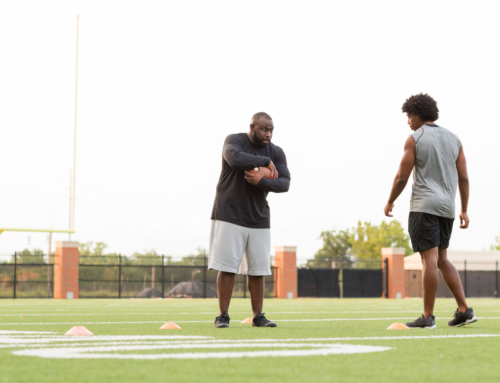Use Data To Build A Dazzling Sports Recruiting Profile
When the Boston Red Sox hired Theo Epstein to serve as general manager, the team was ridiculed by baseball’s old guard for hiring a so-called “stat geek.” Of course, no one was laughing two years later when the Red Sox team Epstein assembled won the organization’s first World Series title in 86 years. By 2016, when Epstein was GM of the Chicago Cubs and the team won its first World Series in 108 years, teams in every major league sport now had a hugely influential analytics department full of “stat geeks.”
The influence of data, and the analytics used to crunch it, has also trickled down to colleges big and small. And, while every college and every coach may use it differently, adding data to your profile can also help dial up your recruiting.
Why It’s Important
If you’ve filled out a recruiting questionnaire, odds are you’re already part of a database. That database may simply be ranking you based on height or weight, or it may be projecting your future physical growth using an algorithm that’s crunching the data of thousands of players in your sport and your age bracket. Some coaches have their own analytics, others tap in to metrics supplied by a larger data set.
When it comes to recruiting, all of that data is important for you because it can give you more chances to stand out. Consider that, while baseball once considered .240 hitters low value players, they may now pay a premium for the same player who hits .290 in crucial situations while putting the ball in play and advancing runners on base. Similarly, while you may have once been considered too small or too slow, a coach could now see how you might grow or how you can contribute to the team based solely on data. Further, that same data can offer you feedback on some areas where you could improve.
What’s Driving The Data Revolution
While intangibles like hunger, competitive fire, or game IQ can’t be quantified, you can bet that every other objective data point will be. And, as every coach looks for an edge in both competition and recruiting, the hunger for accurate data is growing.
Data usage is growing in recruiting because, for many coaches, it can support the confidence they have in the athletes they choose to pursue. Further, some coaches may even make initial evaluations of recruits based solely on data. Plus, as more coaches use analytics as part of their recruiting, the quality and reliability of the data is improving. And, since it can also save time and money, the use of analytics will continue to grow among college coaches.
How You Can Dazzle With Data
Simply put, if there’s a dataset beyond standard statistics that reflects well on you, make sure it’s on your profile. In football, it could be yards after contact. In softball, maybe it’s batting average with runners in scoring position and two outs. In basketball, it might be your 3-point shooting percentage in the last five minutes of a game. If it’s been measured and it paints a positive picture of you, make sure coaches can see it.
If you don’t have access to advanced analytics, you can still use data to boost your recruiting profile. Simply use the stats you can access to show your physical growth and performance gains season over season. Doing so will not only show that you’ve been working at your game for a while, but that you’re also committed to working harder to get to the next level.
Analytics may not show a coach everything you have to offer. However, as the use of data becomes more prevalent in recruiting, a few positive data points on your profile may offer you the chance for more attention from coaches. You never know what may make you stand out to a coach, but adding some data points to your profile is a great way to get a step ahead in recruiting.
If you enjoyed this article, “Use Data To Build A Dazzling Sports Recruiting Profile”, please check out our other articles here.




